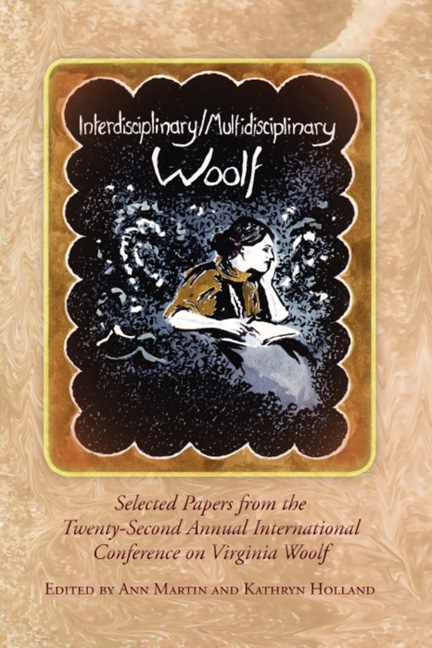Book contents
- Frontmatter
- Contents
- Introduction to Interdisciplinary/Multidisciplinary Woolf
- Acknowledgments
- List of Abbreviations
- History, Materiality, Multiplicity
- Patterns, Practices, Principles
- Art, Influence, Embodiment
- Publishing, Politics, Publics
- “The most unaccountable of machinery”: The Orlando Project produces a textbase of one's own
- The Hotel at the End of the Universe
- Globalization, Inter Connectivity, and Anti-Imperialism: Leonard Woolf, the Hogarth Press, and Kenya
- Chinese Eyes and Muddled Armenians: The Hogarth Press and British Racial Discourse
- “No One Wants Biography”: The Hogarth Press Classifies Orlando
- There Goes the Bride: Virginia Woolf, Julia Strachey, and the Hogarth Press
- Redefining Woolf for the 1990s: Producing and Promoting The “Definitive Collected Edition”
- The Believers: Writers Publishing for Readers, Or Preliminary Musings on The Hogarth Press and McSweeney's
- The Woolfs in Print and Online: A University Press in Transition
- Notes on Contributors
- Conference Program
“The most unaccountable of machinery”: The Orlando Project produces a textbase of one's own
from Publishing, Politics, Publics
- Frontmatter
- Contents
- Introduction to Interdisciplinary/Multidisciplinary Woolf
- Acknowledgments
- List of Abbreviations
- History, Materiality, Multiplicity
- Patterns, Practices, Principles
- Art, Influence, Embodiment
- Publishing, Politics, Publics
- “The most unaccountable of machinery”: The Orlando Project produces a textbase of one's own
- The Hotel at the End of the Universe
- Globalization, Inter Connectivity, and Anti-Imperialism: Leonard Woolf, the Hogarth Press, and Kenya
- Chinese Eyes and Muddled Armenians: The Hogarth Press and British Racial Discourse
- “No One Wants Biography”: The Hogarth Press Classifies Orlando
- There Goes the Bride: Virginia Woolf, Julia Strachey, and the Hogarth Press
- Redefining Woolf for the 1990s: Producing and Promoting The “Definitive Collected Edition”
- The Believers: Writers Publishing for Readers, Or Preliminary Musings on The Hogarth Press and McSweeney's
- The Woolfs in Print and Online: A University Press in Transition
- Notes on Contributors
- Conference Program
Summary
Orlando: Women's Writing in the British Isles from the Beginnings to the Present is a hybrid creation, the descendant of The Feminist Companion to Literature in English (1990, a biographical dictionary of 2700 women writers in the English-speaking world); and it is the product of an experiment in the application of technology to texts. When the Companion went to press, there wasn't room for everything we wanted to print, and we could include only a minimal index, even though it was a big book: 1231 pages, double-column format. Its extensive research was crying out to be written as a history.
Our Orlando is deeply rooted in Woolf's work. Its name reflects the fact that no-one has had more impact on the recognition and understanding of women's writing in history than Woolf. In our history's title, together with the little oak tree that is its logo, we saw ourselves as paying homage to Woolf and to her rich, rollicking, future-embracing Orlando. We had a shared purpose—creation of a history of women's writing from a position widely off-base from the canonical center, in a feminist critical framework—and, in our case, not as a book, but a dynamic literary history delivered online. Our project was highly improbable when it began—but who more inspires improbabilities than Woolf in Orlando?
This essay focuses on the interdisciplinary exploration that is at the core of our Orlando. We address the project's beginnings and early contexts; its present, showing, with screen shots, what the online Orlando can do to support discovery, and what its future, and the future of work in literary and computing studies, may hold. We are acutely conscious as we reflect on our own project, since we began this work the digital has become ubiquitous and that everywhere around us rages discussion, often anxious, of its impacts—on the reproduction of texts, on literature and culture, on teaching. The March 2012 PMLA, for instance, opens with a moving and thoughtful Editor's Column on “The Work of the Book in the Age of Electronic Reproduction” in which Simon Gikandi speaks of his “almost apocalyptic dread that an epoch is ending.”
- Type
- Chapter
- Information
- Interdisciplinary/Multidisciplinary Woolf , pp. 208 - 224Publisher: Liverpool University PressPrint publication year: 2013



